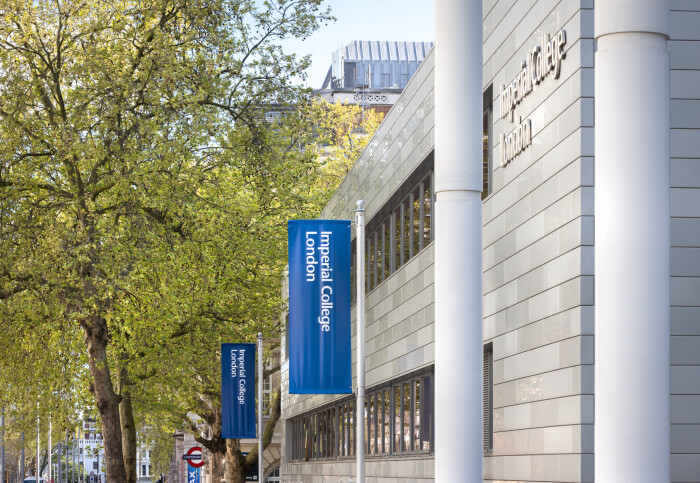Two Imperial scientists elected as Fellows of the Royal Society

Imperial experts in particle physics and robot vision have been granted Fellowship of the Royal Society.
Professor Andrey Golutvin (Department of Physics) and Professor Andrew Davison (Department of Computing) will join more than 70 other members of Imperial staff who are permitted to use the letters FRS after their name.
Fellowships are given to distinguished scientists by the Royal Society in recognition of "contributions to science, both in fundamental research resulting in greater understanding, and also in leading and directing scientific and technological progress in industry and research establishments."
Sir Adrian Smith, President of the Royal Society said: “I am delighted to welcome our newest cohort of Fellows. These individuals have pushed forward the boundaries of their respective fields and had a beneficial influence on the world beyond. They are pioneering scientists and innovators from around the world who have confounded expectations and transformed our thinking.
“This year’s intake have already achieved incredible things, and I have no doubt that they will continue to do so. I look forward to meeting them and following their contributions in future.”
Professor Andrey Golutvin
 Professor Golutvin, from the Department of Physics, is recognised for his outstanding international contributions to ‘heavy flavour’ physics. This branch of study concerns subatomic particles called quarks that are heavier than other quarks. These ‘flavours’ of quark are known as charm (c) and beauty (b) quarks.
Professor Golutvin, from the Department of Physics, is recognised for his outstanding international contributions to ‘heavy flavour’ physics. This branch of study concerns subatomic particles called quarks that are heavier than other quarks. These ‘flavours’ of quark are known as charm (c) and beauty (b) quarks.
Professor Golutvin played a leading role in several ground-breaking experiments in heavy flavour physics since the 1980s, including the ARGUS experiment at DESY, Hamburg, and the LHCb experiment at the Large Hadron Collider, CERN. These experiments have revealed intriguing hints that beauty quarks hold the key to why there is more matter than antimatter in the Universe, allowing everything to physically exist.
He is now working on the Search for Hidden Particles (SHiP) experiment at the CERN Super Proton Synchrotron accelerator. This experiment is designed to look for new heavy particles that only weakly interact with other particles, potentially answering the mystery of why the LHC has failed to find new heavy particles. Finding these could boost several areas of particle and astrophysics, such as providing a dark matter candidate or explaining the inflation of the early Universe.
Professor Golutvin said: “I am deeply honoured and delighted to be elected as a Fellow of the Royal Society. It gives a great boost to my dedication to fundamental science, and in particular to the development of my most recent endeavour, the Search for Hidden Particles (SHiP) experiment at CERN.
“Being an FRS at Imperial is very special for me. I moved to Imperial in 2008, and since then I have come to know many distinguished professors and made many good friends of all ages including students. I look forward to progressing the Society’s purpose of promoting excellence in science and using it for the benefit of humanity.”
Professor Andrew Davison
 Andrew Davison is Professor of Robot Vision at Imperial and leads both the Dyson Robotics Lab and the Robot Vision Group at Imperial’s Department of Computing.
Andrew Davison is Professor of Robot Vision at Imperial and leads both the Dyson Robotics Lab and the Robot Vision Group at Imperial’s Department of Computing.
Professor Davison has made foundational contributions to computer vision in the areas of real-time structure and motion recovery from video sequences. Since the 1990s, he has pioneered the mapping technique Simultaneous Localisation and Mapping (SLAM), using cameras to give robots a 3D ‘awareness’ of the spaces around them. He brought the SLAM acronym and methods from robotics to single-camera computer vision with the breakthrough MonoSLAM algorithm in 2003, which enabled long-term, drift-free, real-time SLAM from a single camera for the first time.
The work inspired many researchers and industry developments in robotics and inside-out tracking for virtual reality and augmented reality. This, together with his algorithms for reconstructing the surfaces of objects and scenes, is now routinely used in robotic applications, and has also influenced the development of the augmented reality industry on mobile devices.
Professor Davison’s main research interests are now in improving the performance of robot vision in terms of dynamics, scale, detail level, efficiency and semantic understanding. At the Dyson Robotics Lab, he leads a team developing computer vision algorithms that will enable robots to move beyond their controlled environments and successfully navigate and interact with the real world. They equip robots to overcome challenging real-world situations such as large indoor or outdoor environments and varying lighting conditions, and teach robots to manipulate real-world objects for applications in service robots.
He said: “I am delighted to become a Fellow of the Royal Society, and am grateful to all of the students, colleagues and collaborators who have contributed to my work. I feel both the honour and responsibility of representing computer vision and robotics as scientific disciplines, especially at the current time when these technologies are increasingly impacting people’s lives."
Article supporters
Article text (excluding photos or graphics) © Imperial College London.
Photos and graphics subject to third party copyright used with permission or © Imperial College London.
Reporter
Hayley Dunning
Communications Division
Caroline Brogan
Communications Division